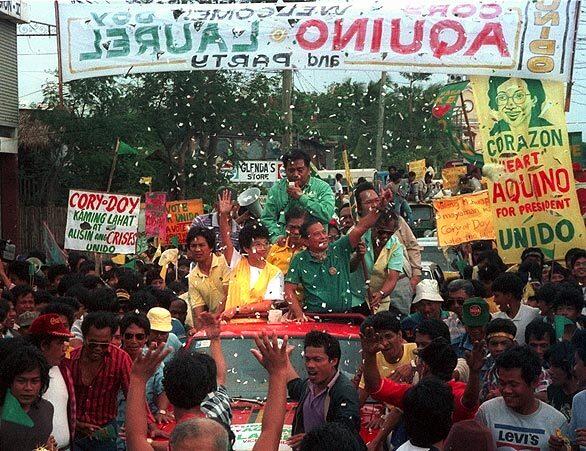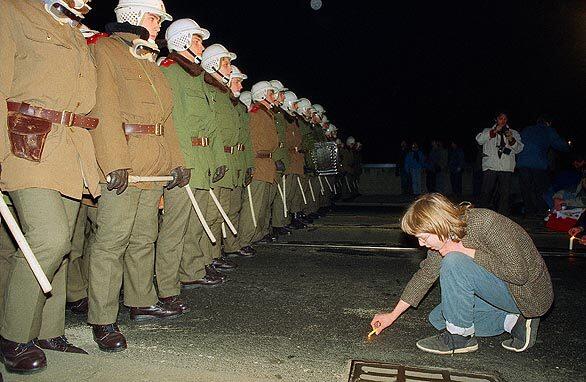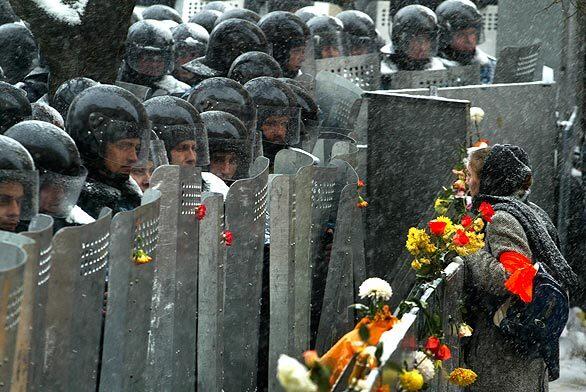
Rule 2. Ruling groups aren’t monolithic, and splits can be important.
There are many anti-government players in Egypt, those seeking secular reform as well as those wanting some form of an Islamic fundamentalist outcome. But those who already inhabit the key institutions, such as the army and government, are groups whose support must be wooed.
In Iran, Mousavi can trace his revolutionary roots back to 1979 when Ayatollah Ruhollah Khomeini consolidated his power after the shah was forced to flee Tehran. Mousavi eventually rose through the government to become prime minister. There have been reports that he and the current supreme ruler, Khamenei, have clashed over the years. But now that Mousavi is the face of reform, perhaps he can count on some support from within the ruling group.
Such support is always a plus, as seen in the Philippines. People had been fighting against the despotic rule of Ferdinand Marcos for years, until the situation became more urgent in the 1980s.
Corazon Aquino became the widow of Sen. Benigno Aquino Jr. when he was assassinated on his return from exile on Aug. 21, 1983. She was drafted to run against Marcos in the 1986 snap presidential elections. Marcos claimed victory amid the usual reports of electoral fraud.
It was on Feb. 22, 1986, that two Marcos allies, Defense Minister Juan Ponce Enrile and Lt. Gen. Fidel V. Ramos, defected. Corazon Aquino returned to Manila and joined the growing crowds. Three days later, Corazon Aquino and Marcos both took the presidential oath of office. By nightfall, Marcos was forced to flee into exile.
Photo: Confetti rains down on Filipino opposition candidate Corazon Aquino and her running mate, Salvador Laurel, as their motorcade crawls through a crowd packing the streets of Naga City, Philippines, in 1986. (Val Rodriguez / Associated Press)

Rule 4. Repression works in the short term but doesn’t guarantee the end of calls for liberalization.
Outsiders have criticized ruling groups over the ages for not giving protesters at least some reforms. But as those on the top have learned over the years, giving an inch can often mean losing by a mile. The alternative, sharp repression, often means driving reform elements underground where they can continue to grow.
Egyptian President Hosni Mubarak has survived past calls for reform. But the most glaring modern examples involve the collapse of Soviet control in Eastern Europe.
In the Prague Spring of 1968, liberals sought reforms such as an easing of restrictions on the media, speech and travel. As reformers gained strength, the Soviet Union and its allies in the Warsaw Pact eventually responded with tanks and troops.
By 1989, however, with the Soviet system crumpling throughout Europe, Czechoslovakia fared better in its Velvet Revolution.
On Nov. 17, 1989, riot police suppressed a peaceful student demonstration in Prague. The police raids in Prague sparked demonstrations and eventually a limited general strike by the end of November.
This time, there were no invasions because Soviet-style regimes were in jeopardy in Europe. By early December, the first non-Communist government in Czechoslovakia since 1948 was in power. On Dec. 28, 1989, Václav Havel, a human-rights activist and playwright, became the liberal president.
Photo: A woman lights a candle in front of riot police in the former Czechoslovakia. (Peter Dejong / Associated Press)








